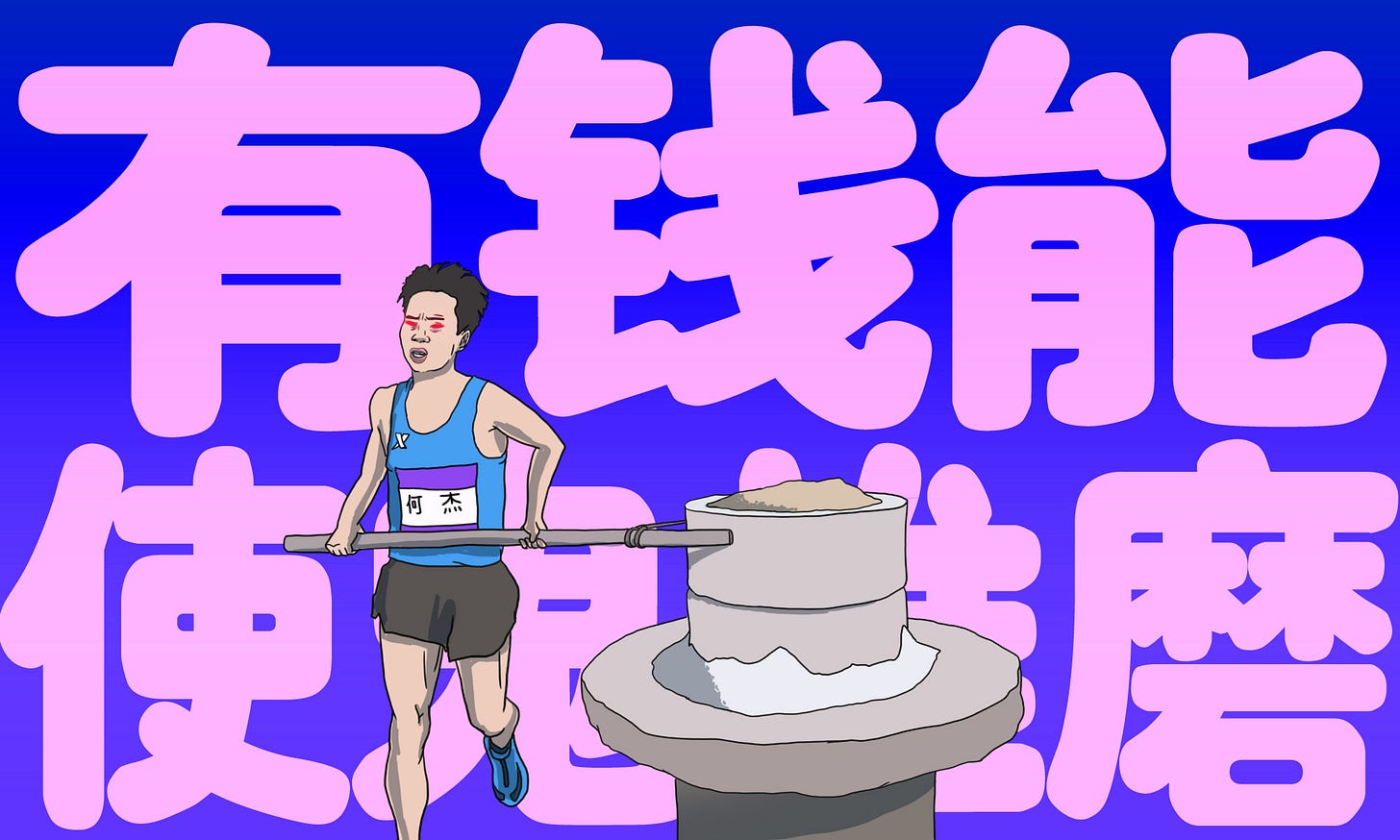"Money will make the devil turn the millstone" — Phrase of the week
Alleged fixing of the Beijing Half Marathon reveals murky world in sponsorship of the sport

Our phrase of the week is: "money will make the devil turn the millstone" (有钱能使鬼推磨 yǒuqián néng shǐ guǐ tuīmò).
Context
Organizers of the Beijing Half Marathon are investigating allegations that three international competitors deliberately allowed China's star runner, Hé Jié 何杰, to win the race which took place last Sunday.
Kenya's Robert Keter and Willy Mnangat, and Ethiopia's Dejene Hailu, were seen slowing down and waving the Chinese runner past to take the lead just 200 meters from the finish line.
He Jie finished in 63 minutes 44 seconds, one second ahead of the other three runners, who tied for second place.
All four athletes are sponsored by footwear brand, XStep (特步 tèbù), which was also a major sponsor of the race.
And it’s widely believed that XStep paid the three international runners to let He Jie win.
There’s unwritten rule in China’s marathon scene that a major sponsor like XStep is much more likely to have its runners featured prominently on and off the podium, as one media commentator notes:
There is nothing new about “power struggle” among brand sponsors in sports competitions. It is also not inconceivable to fix a competition by disqualifying some participants. But what I didn’t know, and what I was surprised to see, is such blatant cheating following the playbook of "money makes the world go round".
体育比赛之中存在品牌方之间“权力的游戏”,早已不是什么新鲜事,甚至像取消比赛选手比赛资格的暗箱操作,也都可以想象。但我竟不知,也不敢相信,弄虚作假,有钱能使鬼推磨的把戏,什么时候竟然如此明目张胆,堂而皇之了?
Tǐyù bǐsài zhīzhōng cúnzài pǐnpáifāng zhījiān “quánlì de yóuxì”, zǎoyǐ búshì shénme xīnxiān shì, shènzhì xiàng qǔxiāo bǐsài xuǎnshǒu bǐsài zīgé de ànxiāng cāozuò, yě dū kěyǐ xiǎngxiàng. Dàn wǒ jìng bùzhī, yě bùgǎn xiāngxìn, nòngxūzuòjiǎ, yǒuqián néng shǐ guǐ tuīmò de bǎxì, shénme shíhòu jìngrán rúcǐ míngmùzhāngdǎn, táng'érhuángzhī le?
And with that we have our Sinica Phrase of the Week.
What it means
"Money makes the world go round" is a colloquial phrase, known as a súyǔ (俗语).
It directly translates as "having money" (有钱 yǒuqián), "can make the devil turn the millstone" (能使鬼推磨 néng shǐ guǐ tuīmò).
The phrase was first coined by Ming dynasty writer, Féng Mènglóng 冯梦龙, in Stories to Enlighten the World (喻世明言 yùshì míngyán).
Feng was a Chinese historian, novelist, and poet of the late Ming Dynasty.
Stories to Enlighten the World, also translated as Stories Old and New, was published in Suzhou in 1620, and is the first in a trilogy of collections of short stories by Feng. It’s considered to be a pivotal work in the development of Chinese vernacular fiction.
The passage where our Phrase of the Week is found is:
No authorities can be strict for three days in a row, because money will make the devil turn the millstone.
正是‘官无三日紧’,又道是有钱能使鬼推磨。
Zhèng shì ‘guān wú sān rì jǐn’, yòu dào shì yǒu qián néng shǐ guǐ tuī mò.
Feng was referring to how corrupt officials of the late Ming would do anything for money and personal gain.
In English there are a number of phrases which have an equivalent meaning, like "money talks", and "money makes the world go round".
But in the context of the fixed Beijing Half Marathon, we prefer the translation: "Money can make the devil turn the millstone", which better conveys the alleged murky dealings behind the sponsorship of the race, and more widely in the unwritten rules of the sport.
Andrew Methven is the author of RealTime Mandarin, a resource to helping you learn contemporary Chinese in context, maintain and improve your Mandarin skills, and stay on top of the latest language trends in China.
Read more about how this story is being discussed in the Chinese media in this week’s RealTime Mandarin.


